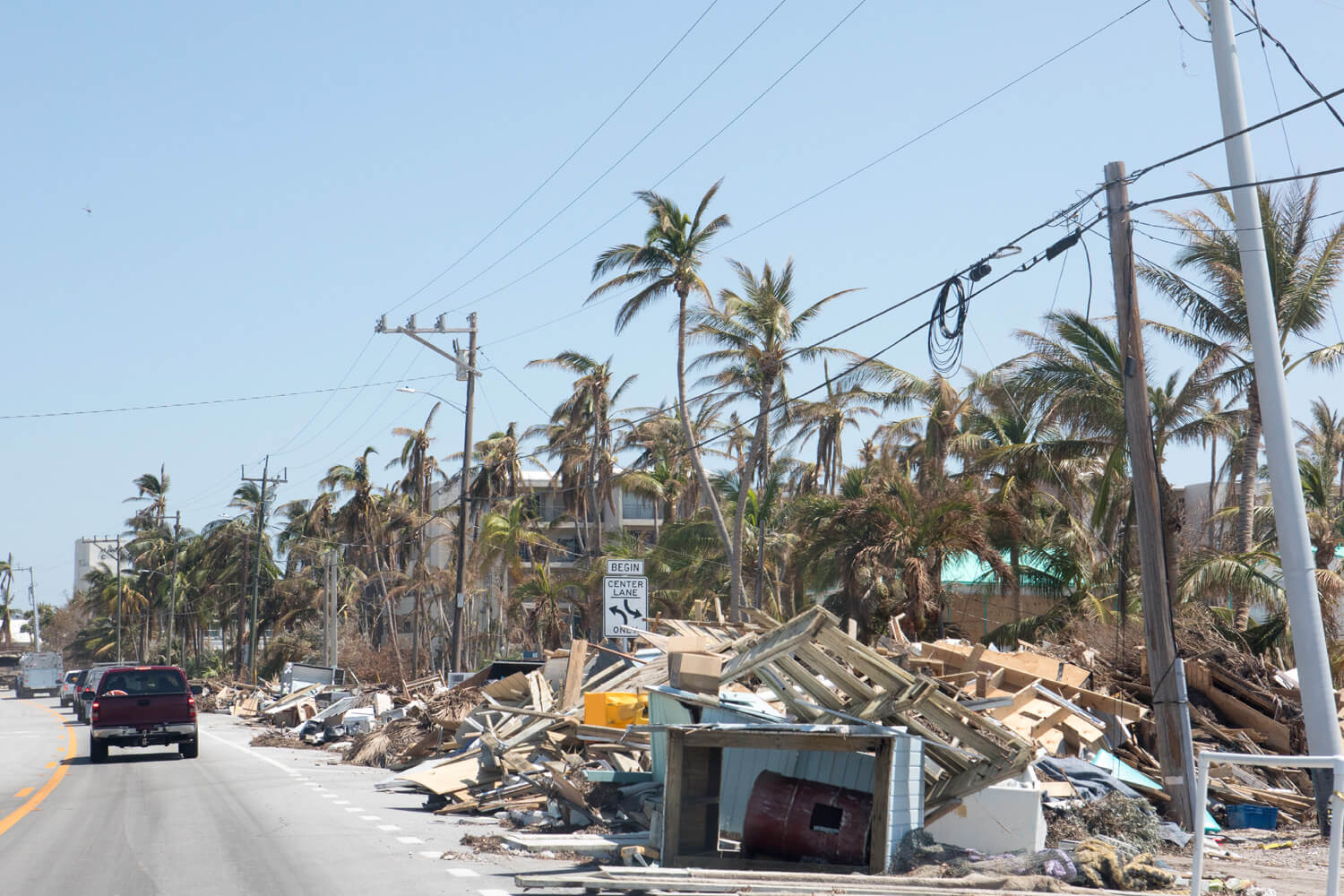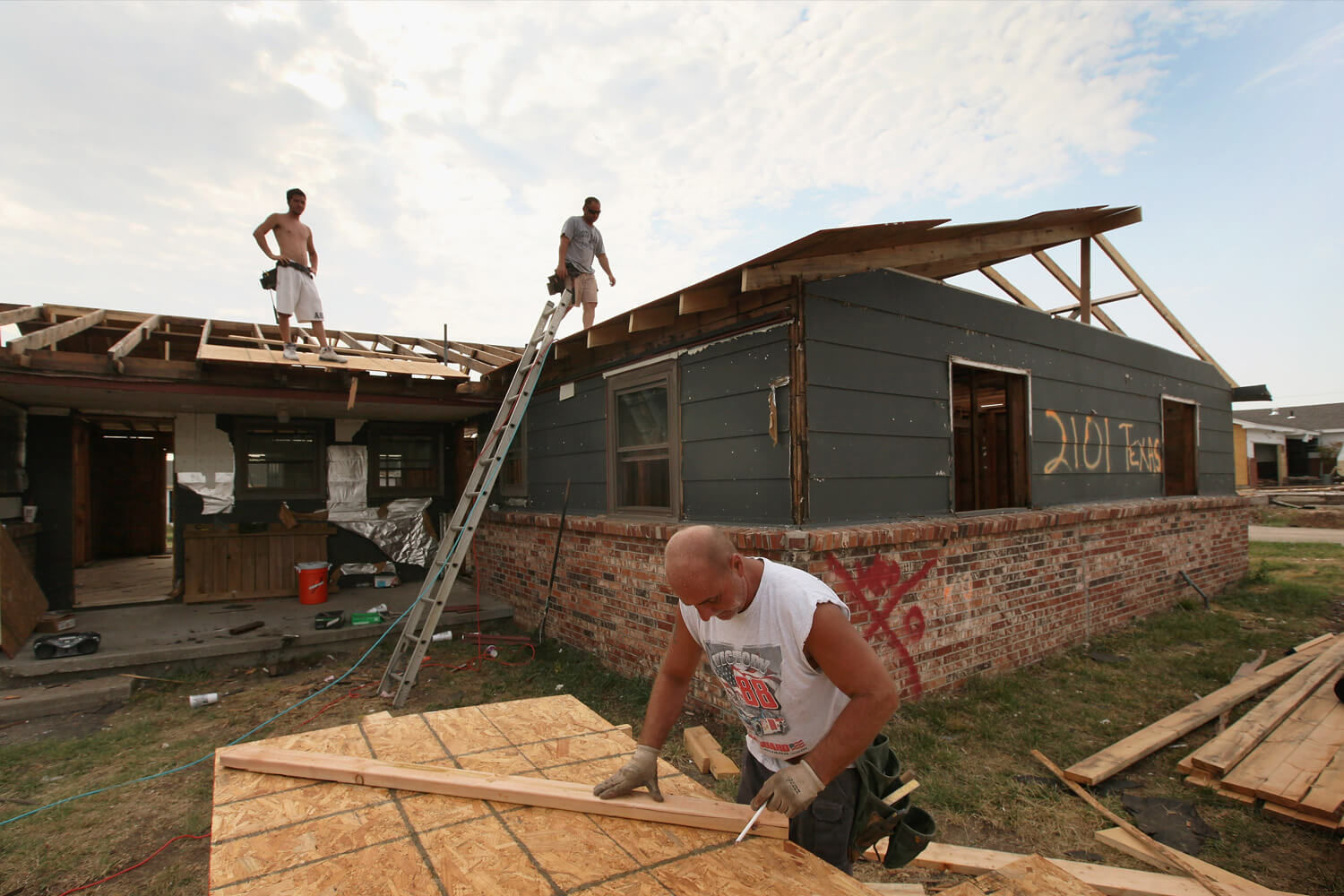Hurricane Legal Questions: Post-Storm Rights Guide

Editor's note: This post was originally published August 29, 2023, and has been updated for accuracy, comprehensiveness and freshness on October 2, 2025.
After a hurricane makes landfall, property damage and insurance disputes create complex legal challenges. Understanding your rights and responsibilities can help you navigate the recovery process more effectively and avoid costly mistakes.
We want to help you make the best decisions and feel empowered while dealing with these pressing issues. That’s why we’ve laid out this guide for you. We’ll address the most common legal questions that arise after hurricanes and severe storms, covering everything from insurance claims to landlord-tenant disputes.

Homeowner and property owner legal questions after a hurricane
What are my legal rights after hurricane damage to my property?
As a property owner, you have several important legal rights following hurricane damage such as insurance claims, dispute settlements, and documentation rights. It’s important for you to check with your insurance provider to see what your specific rights are. However, as a general rule, these standards may apply to you:
- Insurance claim rights: You may be entitled to file claims for covered damages and receive fair settlement offers from your insurance company. Your insurer must investigate claims promptly and in good faith.
- Right to dispute settlements: If you believe your insurance settlement is inadequate, you may have the right to dispute it through mediation, arbitration, or legal action.
- Documentation rights: You can document damage extensively with photos, videos, and professional assessments to support your claims.
Can I sue my insurance company for denying a hurricane damage claim?
Yes, you can take legal action if your insurance company wrongfully denies a legitimate claim. However, litigation should typically be a last resort.
- Alternative dispute resolution: Before filing a lawsuit, consider requesting mediation with your insurer. This process is often faster and less expensive than court proceedings.
- Bad faith claims: If your insurance company acts in bad faith by unreasonably denying or delaying your claim, you may have grounds for additional damages beyond your original claim amount.
What is the deadline for filing a hurricane insurance claim in my state?
Insurance claim deadlines vary by state and policy type, but most homeowner's policies require notification within a specific timeframe:
- Immediate notification: Most policies require you to notify your insurer "as soon as practicable" after discovering damage.
- Formal deadlines: Many states require claims to be filed within 1-2 years of the loss.
- Documentation deadlines: Some policies have shorter deadlines for providing supporting documentation.
Important: Contact your insurance company immediately after discovering damage, even if you haven't fully assessed the extent of the loss.
How can I dispute a low insurance settlement for hurricane damage?
Several strategies can help you challenge an inadequate settlement offer:
Gather additional evidence:
- Obtain independent contractor estimates.
- Hire a public adjuster to reassess damages.
- Document all repair costs and temporary living expenses.
- Collect photos and videos showing the full extent of damage.
Request claim file review: Ask your insurance company to provide your complete claim file, including their adjuster's report and damage calculations.
Consider professional help: A qualified attorney can review your policy, assess your claim's value, and negotiate with your insurance company.
Am I eligible for compensation for temporary housing after a hurricane?
If your home ever becomes unlivable after a covered event, Additional Living Expenses (ALE) coverage in your homeowners insurance can step in to help. This part of your policy is designed to pay for temporary housing like hotels or rentals, along with meals and other extra costs while you’re displaced. Just keep in mind that ALE coverage usually has both time and dollar limits, so it’s not endless. The best way to make sure everything gets reimbursed is to hold onto every receipt, whether it’s for lodging, meals, or other day-to-day expenses.
What is the difference between hurricane damage coverage and flood insurance?
Hurricane insurance and flood insurance protect against different types of storm damage. Homeowners or hurricane policies typically cover wind-related issues such as roof damage, broken windows, and other structural problems caused by strong winds. Flooding and storm surge, on the other hand, fall under flood insurance, which must be purchased separately. Most standard homeowners policies exclude flood damage, which makes a separate flood policy especially important in areas that face frequent hurricanes. The easiest way to tell the difference is by the source of the damage: rising water is considered a flood, while destruction caused by heavy winds is usually covered under wind protection.
Standard homeowner's insurance covers:
- Wind damage from hurricanes
- Damage from wind-driven rain
- Falling trees and debris
- Some water damage if caused by wind damage first
Standard flood insurance covers:
- Rising water from storm surge
- Flooding from overwhelmed drainage systems
- Ground saturation and standing water
- Basement flooding from external water sources
Key takeaway: Most hurricane-related water damage requires separate flood insurance through the National Flood Insurance Program (NFIP) or private insurers.
Can I hold a contractor liable for faulty repairs after a hurricane?
Yes, you can hold a contractor liable for faulty hurricane repairs. If their work was negligent, fraudulent, or violated the terms of your contract, you have the right to take action. That might mean pursuing a lawsuit or filing a complaint with your state licensing board to hold them accountable.
Specific protections and requirements apply:
- Written contracts: Always require detailed written contracts specifying materials, timelines, and quality standards before work begins.
- Licensing verification: Verify that contractors are properly licensed in your state and carry appropriate insurance coverage.
- Documentation: Keep detailed records of all communications, payments, and work progress throughout the project.
- Legal remedies: If contractors fail to meet contractual obligations, you may be entitled to damages for repair costs, delays, and additional expenses.

What evidence should I collect for a hurricane damage insurance dispute?
To strengthen a hurricane damage insurance dispute, you need solid evidence. Take clear photos and videos of all damage, make an itemized list of personal property that was affected, and keep receipts for any temporary repairs. You should also have a copy of your insurance policy, proof of ownership for damaged items, professional repair estimates, and a record of every conversation with your insurance company. This documentation shows the extent of the damage and is often the key to overturning a denied or underpaid claim.
Visual evidence:
- Photos and videos of damage from multiple angles
- Before-and-after comparisons if available
- Documentation of personal property damage
- Images showing the cause of damage (fallen trees due to wind damage, etc.)
Financial documentation:
- Original receipts for damaged items
- Repair estimates from licensed contractors
- Receipts for temporary housing and living expenses
- Inventory lists of damaged personal property
Professional assessments:
- Independent adjuster reports
- Engineering reports for structural damage
- Restoration company assessments
Can I get free or contingency legal help for hurricane damage claims?
Several options exist for affordable legal assistance with hurricane damage claims:
- Legal aid organizations: Many areas have disaster relief legal aid services that provide free assistance to qualifying individuals.
- Legal coverage plans: Services like LegalShield provide access to attorneys for consultation and document review for a low monthly fee.
- Bar association referrals: State bar associations often maintain referral services for attorneys who practice insurance law.
Are there special disaster relief laws for homeowners after a hurricane?
Yes, there are special disaster relief laws that help homeowners after a hurricane, both at the federal and state level. The kind of assistance you qualify for depends on several factors. Federal relief only kicks in when the president issues an official disaster declaration. On top of that, each state has its own rules. Some states provide extra support, like property tax breaks or faster permitting, to make recovery a little easier.
- Federal disaster declarations: When the president declares a federal disaster, additional resources become available through FEMA and other agencies.
- State-specific programs: Many hurricane-prone states have special disaster relief funds and expedited permitting processes for repairs.
- Mortgage relief programs: Federal agencies often coordinate with lenders to provide temporary payment deferrals or loan modifications.
- Tax relief: The IRS may provide deadline extensions and special deductions for casualty losses in declared disaster areas.
What are my options if FEMA denies my hurricane assistance application?
If FEMA denies your hurricane assistance application, you can still fight the decision. The main option is to file an appeal, and you need to do it within 60 days of the denial letter. You can submit your appeal online through your FEMA account, mail it, fax it, or drop it off at a Disaster Recovery Center. Beyond that, you may also have other options, such as:
- State and local programs: Many states and municipalities offer additional disaster assistance programs that may have different eligibility requirements.
- Non-profit assistance: Organizations like the American Red Cross, Salvation Army, and faith-based groups often provide disaster relief assistance.
- SBA disaster loans: The Small Business Administration provides low-interest disaster loans for homeowners and renters to repair or replace damaged property.
How long do I have to file a lawsuit for hurricane-related damages?
Statutes of limitations vary by state and type of claim. Insurance disputes, property damage claims, construction defects and more all vary in the amount of time you have to deal with them. Consult with a LegalShield lawyer promptly to find out what you can do.
Am I liable for damage caused by my tree falling during a hurricane?
You’re generally not responsible if your tree falls during a hurricane because it’s considered an Act of God, meaning it was beyond your control. Liability only shifts to you if you were negligent. For example, if the tree was dead, diseased, or unstable and you failed to take care of it, then you could be held accountable. In most situations, your homeowners insurance is what covers the damage. If this happens, the first step is to reach out to your insurance company and file a claim.
- Insurance coverage: Your liability insurance may cover damage your tree causes to neighboring property, but coverage depends on the specific circumstances and policy terms.
- Removal responsibility: Regardless of liability, removing the fallen tree typically becomes the responsibility of the property owner where it landed.
Why is my hurricane insurance check payable to both me and my mortgage lender?
Your insurance check is usually made out to both you and your mortgage lender because the lender has a financial stake in your home. They want to make sure the money is actually used to repair the property since the home is their collateral for the loan. To access the funds, you’ll need to contact your lender. In most cases, they’ll endorse the check and then release the money in stages as the repairs are completed.
What should I do if my insurance company denies my hurricane roof damage claim?
If your insurance company denies your hurricane roof damage claim, start by carefully reading the denial letter to understand why. Next, go back through your policy to see what is and isn’t covered. Gather additional evidence, such as a professional roof inspection, and use it to file a formal written appeal with your insurer. If that appeal doesn’t work, you still have options. You can file a complaint with your state’s Department of Insurance, request mediation, or hire an attorney to take legal action.
HOA and mortgage-related hurricane questions
Can I withhold HOA dues until common area hurricane repairs are completed?
No, you cannot legally withhold HOA dues, even if common areas need hurricane repairs. These dues cover more than just immediate fixes; they fund ongoing operations and reserve accounts that keep the community running. Because all homeowners are part of the association, everyone shares responsibility for repair costs and decision-making. If you have concerns about how repairs are being handled, the right approach is to raise them through official HOA channels, such as board meetings or dispute resolution procedures. Keep in mind that major repair projects may require special assessments or budget changes, which typically need input and approval from the homeowners as a group.
Is my mortgage lender required to offer payment relief after hurricane damage?
No general law requires mortgage payment deferrals.

Landlord and tenant legal questions after a hurricane
What legal steps can I take if my landlord will not repair hurricane damage?
If your landlord refuses to repair hurricane damage, start by sending a formal written notice asking for the repairs. If they still don’t take action within a reasonable time, you may have the right to end your lease. You can also report the issue to local building or health code enforcement, request a rent reduction if the property is uninhabitable, or consider legal action. In cases where the damage is so severe that the home is unsafe to live in, you may also qualify for FEMA assistance to help with relocation or other expenses.
- Written notice requirement: Most states require tenants to provide written notice to landlords specifying needed repairs and providing a reasonable time frame (typically 7-30 days) for completion.
- Habitability standards: If damage makes the property uninhabitable, you may have grounds to terminate the lease or withhold rent in some states.
- Repair and deduct: Some states allow tenants to arrange repairs themselves and deduct costs from rent, but this requires following specific procedures.
- Legal action: If landlords fail to respond to proper notice, you may be able to pursue legal action for damages or lease termination.
Who is responsible for hurricane damage in a rental property – tenant or landlord?
The landlord is usually responsible for repairing hurricane damage to the structure of a rental property since they are required to keep the home safe and livable. Tenants are only responsible for damage they directly cause, not damage from a natural disaster. Review your lease terms to understand who is responsible for what.
Landlord responsibilities:
- Structural damage to the building
- Damage to major systems (HVAC, plumbing, electrical)
- Repairs needed to maintain habitability
- Common area damage
Tenant responsibilities:
- Damage caused by tenant negligence
- Personal property damage (unless landlord's negligence contributed)
- Minor repairs specified in the lease agreement
Lease provisions: Your lease agreement may specify different responsibilities, so review it carefully after any damage occurs.
Can I get reimbursed if my personal property is damaged in a rental during a hurricane?
Personal property reimbursement depends on insurance coverage and fault. Document everything with inventories, receipts and photos. And as always, make sure to consult with your LegalShield lawyer to find out what you can do about personal property reimbursement.
Am I responsible for hurricane damage to a rental property I occupy?
Generally, tenants are not responsible for hurricane damage unless negligence is involved.
Renter's insurance and personal property questions after a hurricane
Does renter's insurance cover hurricane damage to personal property?
Yes, renters insurance covers hurricane damage to your personal property when it’s caused by wind, hail, lightning, or fire. It does not cover flood damage. For losses from storm surge or rising water, you need a separate flood insurance policy. Your renters policy helps pay to repair or replace your belongings up to your coverage limits.
Employment and public safety legal questions during a hurricane
Is it legal for an employer to require me to work during a hurricane?
Yes, in many cases an employer can require you to work during a hurricane. They must keep the workplace safe, pay you correctly, and they cannot make you ignore a mandatory evacuation order. You can refuse work if you have a genuine good faith belief that the job presents a risk of serious physical harm or death, and you already reported the danger to your employer.
Employment requirements during hurricanes depend on several factors:
- Essential services: Employers in essential services (healthcare, emergency response, utilities) may have more latitude to require work during storms.
- Safety considerations: Employers must provide safe working conditions and cannot require employees to work in genuinely dangerous situations.
- Government orders: If government authorities issue evacuation orders or travel bans, employers generally cannot require violation of these orders.
- Labor agreements: Union contracts or employment agreements may provide specific protections during natural disasters.
Is it legal to restrict or limit access to water during a hurricane?
Water access restrictions during hurricanes raise real legal and ethical concerns. Public utilities, especially government-owned systems, generally cannot cut off or arbitrarily limit water during an emergency. Private suppliers may operate under different rules, but they are often subject to emergency orders that control access and pricing. During a declared disaster, authorities can use emergency powers to require water conservation to protect public health. Most states also enforce price gouging laws that ban excessive price increases for essential supplies like bottled water. If you suspect unfair limits or pricing, document what happened and report it to your state attorney general or utility regulator.
Is it legal to limit access to storm supplies during a hurricane?
During a state of emergency like a hurricane, businesses are generally barred from charging excessive prices for storm supplies. That is price gouging and it is illegal. Stores can still set reasonable quantity limits per customer to spread goods fairly and prevent hoarding. These limits should be applied the same way to all customers and only while supplies last. Save your receipts, note prices and signs, and report suspected price gouging to your state attorney general or consumer protection agency.
Travel and accommodation legal questions during a hurricane
Can hotels refuse to allow pets during a hurricane evacuation?
Yes, hotels are not required to accept pets during a hurricane evacuation. The PETS Act helps states plan for pet accommodation and transport, but it does not force private businesses to take animals. Some hotels may relax their no pets policy during emergencies, but that is voluntary. Hotels must accept service animals and cannot refuse guests with disabilities, yet they are not obligated to house companion animals. Plan ahead. Make a list of pet friendly hotels and shelters and call early in hurricane season to secure a room.

How LegalShield helps with hurricane-related legal issues
When hurricane damage creates complex legal situations, having access to attorneys can make the difference between a successful resolution and costly mistakes. LegalShield provides access to provider law firms ready to assist with consumer finance issues, billing and contract disputes, and other personal legal matters for an affordable monthly fee.
Legal support for natural disaster recovery
LegalShield Members can contact provider lawyers for legal advice on consumer law matters including insurance disputes, contractor issues, and debt problems that often arise after natural disasters. Depending on the plan you choose, your membership may cover:
- Insurance claim assistance
- Contractor and repair issues
- Consumer finance protection
- Answers to unlimited legal questions
- And more essential legal services
Legal coverage for disaster recovery
LegalShield allows you to send a certain number of pages in personal legal documents to your provider law firm for review and feedback. If your paperwork exceeds the allowed number of pages, you only have to pay a discounted fee – not hundreds of dollars per hour. This service proves invaluable when dealing with:
- Insurance policy interpretation
- Contractor agreements and warranties
- FEMA application documentation
- Mortgage modification paperwork
- HOA dispute communications
- Landlord-tenant correspondence
Services like consultation with a lawyer, document review, and civil trial defense are included as standard benefits, potentially saving thousands of dollars in legal fees.
Legal guidance when you need it most
Natural disasters create urgent legal situations that require immediate attention. LegalShield provides legal advice on unlimited personal legal issues from lawyers with an average of 22 years of experience, ensuring you receive qualified guidance during your recovery process.
Whether you're dealing with insurance claim denials, contractor disputes, mortgage payment issues, or tenant-landlord conflicts after a hurricane, having legal advice readily available can protect your rights and financial interests.
Protect your future with a LegalShield Membership
Don't wait until disaster strikes to secure legal protection. Join the millions of families and individuals who trust LegalShield for affordable, legal coverage.
Ready to protect yourself and your family? View LegalShield plan options and start your membership today – because when legal challenges arise, you'll want experienced attorneys on your side, not expensive legal bills in your mailbox.
LegalShield is a trademark of Pre-Paid Legal Services, Inc. (“LegalShield”). LegalShield provides this blog as a public service and for general information only. The information made available in this blog is meant to provide general information and is not intended to provide legal advice, render an opinion, or provide a recommendation as to a specific matter. The blog post is not a substitute for competent legal counsel from a licensed professional lawyer in the state or province where your legal issues exist, and you should seek legal counsel for your specific legal matter. All information by authors is accepted in good faith. However, LegalShield makes no representation or warranty of any kind, express or implied, regarding the accuracy, adequacy, validity, reliability, availability, or completeness of such information. The materials contained herein are not regularly updated and may not reflect the most current legal information. No person should either act or refrain from acting on the basis of anything contained on this website. Nothing on this blog is meant to, or does, create an attorney-client relationship with any reader or user. An attorney-client relationship may be formed only after the execution of an engagement letter with an attorney and after that attorney has confirmed that no conflicts of interest exist. Nothing on this website, or information contained or transmitted by this website, is intended to be an advertisement or solicitation. Information contained in the blog may be provided by authors who could be a third-party paid contributor. LegalShield provides access to legal services offered by a network of provider law firms to LegalShield members through membership-based participation. LegalShield is not a law firm, and its officers, employees or sales associates do not directly or indirectly provide legal services, representation, or advice.



